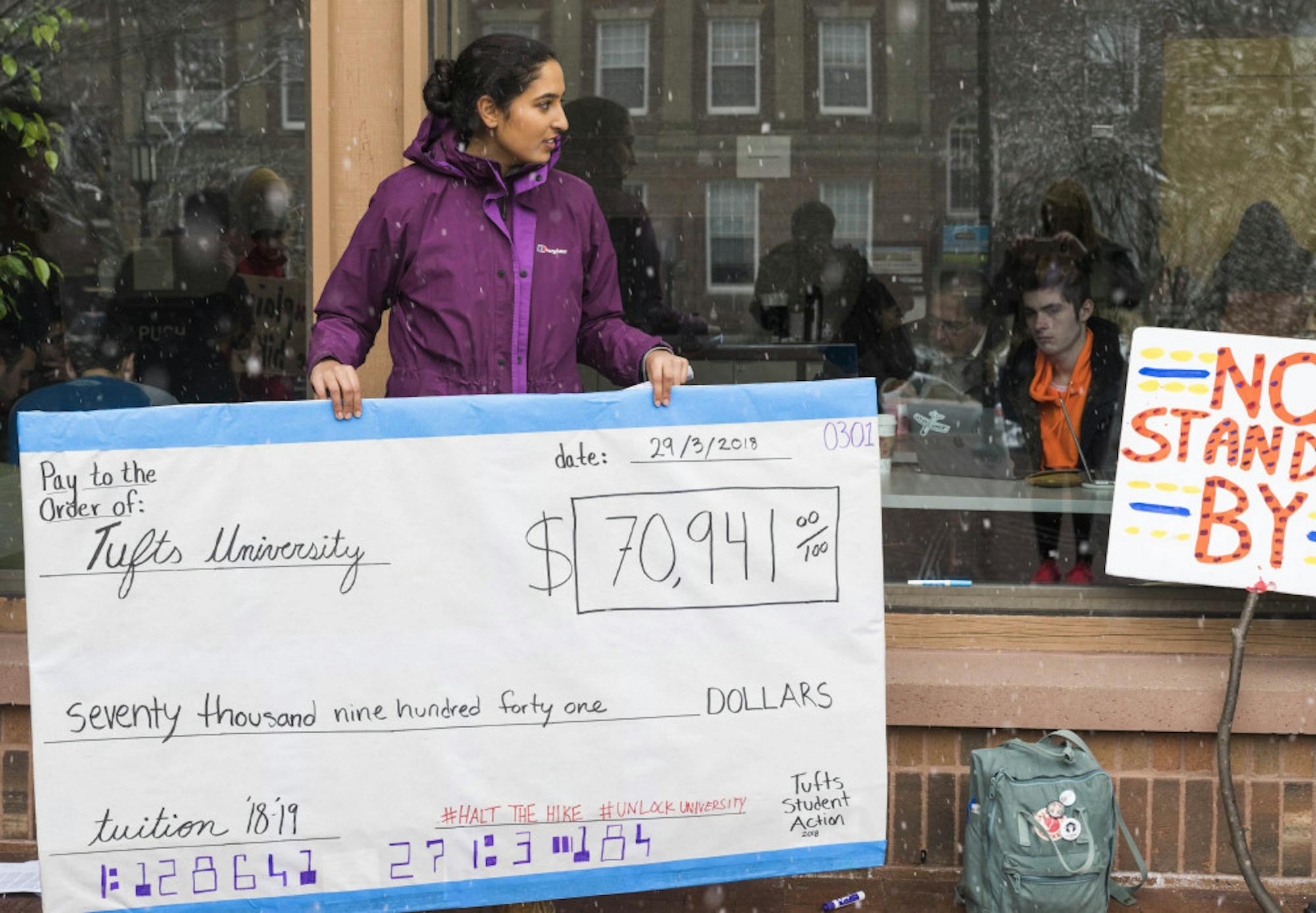On the afternoon of Monday, April 2, about 20 students gathered on the lower patio of the Mayer Campus Center as part of a rally to protest the raise in tuition for the 2018-2019 academic year.
The tuition increase was announced in a March 29 email from James Glaser, Dean of the School of Arts and Sciences, and Jianmin Qu, Dean of the School of Engineering. According to this email, tuition and fees for the upcoming academic year will be $70,941 in total, a 3.76% increase from last year’s $68,372.
The rally, organized by student group Tufts Student Action, began with short speeches by Amira al-Subaey, a junior, and Ava Ciosek, a first-year, both of whom expressed their disapproval of the impending tuition hike and advocated for Tufts to “halt the hike.”
“When Tufts Admissions proclaim that they cover 100 percent of financial need, all I think about is the fact that I was forced to take out over $20,000 in private loans from private banks with absurd interest rates to continue my Tufts education,” al-Subaey said in a portion of her speech. “I know that this isn’t fair and that’s why I organize with [Tufts Student Action], because I believe that a world where I don’t have to sacrifice my family’s financial stability and shackle myself to a lifetime of debt is possible.”
After the short speech, the group participated in several chants, such as “Affordable tuition, need-blind admission,” and “Stop this exploitation, respect our right to education.” Later, the students moved into the Mayer Campus Center with a large poster of a check for $70,941, representing the cost of tuition at Tufts. Several students signed the check with reasons why they support halting tuition hikes.
During the rally, al-Subaey told the Daily that as a student on financial aid, stopping tuition increases is personal to her, and that financial aid does not always increase proportionally with tuition increases.
“I believe ... education is a fundamental human right, and I think that $71,000 a year doesn’t reflect that,” al-Subaey said, “We’re inundated with this rhetoric [from the administration] that Tufts is accessible and meets 100 percent of demonstrated financial need, [but] there are low-income students like me on this campus that are food insecure, that use the food bank that [TCU Senate] created, or that are on private student loans, or that have to drop out or transfer or take a leave of absence because they can’t afford to pay [for] the next semester.”
Al-Subaey also spoke about the university’s response to the demand to halt tuition hikes, noting that the university often responds by saying that students do not understand complex financial concepts.
“[The administration] is saying that first of all you don’t understand these issues, they’re more complicated than you think ... and that Tufts is staying in line with other elite universities’ increases in tuition,” al-Subaey said. “They also say that it’s the Board of Trustees that make these decisions, not us.”
Ciosek talked about Tufts Student Action’s efforts to increase transparency, accountability and accessibility in the budgeting process and deciding how much tuition will be each year.
“In terms of transparency, we want to know where the money is going especially where it pertains to the Board of Trustees. There’s a lot of incentives for tuition increases because of the occupations they all have,” Ciosek said. “With accountability, we want the administration to take responsibility for the tuition increases...and not just blame it on increasing janitorial staff wages, or unionizing workers. [The administration] definitely tries to separate and divide activist groups in order to oppress all.”
Ciosek emphasized the importance of accessibility in education, noting that forcing students to choose between learning and affording an education is not fair. Ciosek also spoke about other work that Tufts Student Action is planning regarding accessibility to education.
“We’ve been talking about a tuition freeze ... and we’ve been trying to pressure Massachusetts gubernatorial candidates to make free higher education an important issue for local governments so it will eventually be an issue at the national level,” said Ciosek.
Al-Subaey also mentioned two TCU Senate resolutions concerning affordability at Tufts. One of these, "S. 18-2 A Resolution Asking Tufts to Maintain its Current Level of Affordability," will be presented at the Senate meeting on April 8. TSA is working with Tufts Housing League to draft another resolution, "A Resolution to Create a Formal and Transparent System for the Request of Institutional Information at Tufts," the abstract of which is available now.
At the end of the rally, the group marched to Ballou Hall to present the check and their demands to the administration. Elizabeth Dossett, a junior, spoke more about the specific demands for the administration.
“[We want] justification and explanation for all tuition increases, for Tufts to live up to its claim of meeting 100% of demonstrated financial aid, and for greater transparency in how financial aid is calculated,” said Dossett. “We want Tufts to move to a need-blind admissions policy, because over 200 students a year are rejected because of their low-income status. We also want community based-budgeting, which means making these tuition decisions as a community with professors, students, parents, and everyone who is affected by them getting a seat at the table.”
Tufts Student Action holds rally to protest tuition hike

Students participate in a protest against Tufts' tuition hikes on the Lower Campus Center patio on April 2, 2018.





